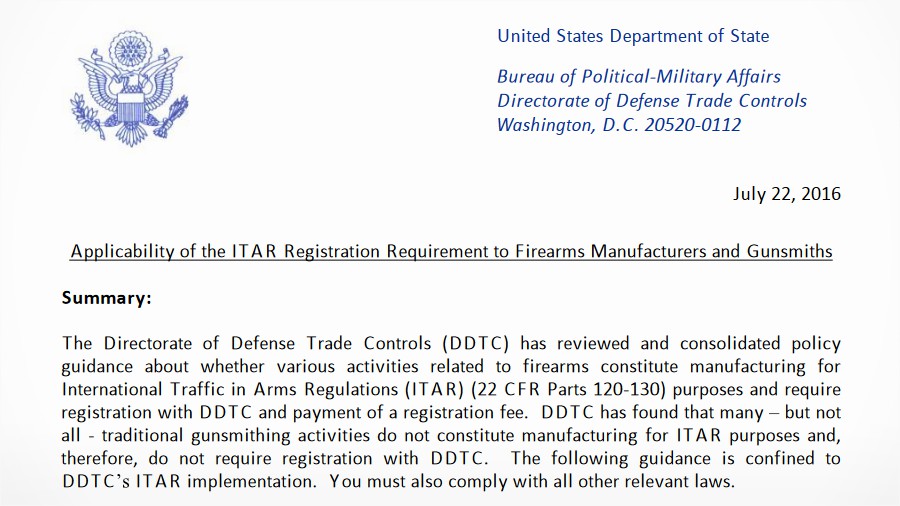
The Department of State is issuing new guidelines requiring many machine shops and gunsmiths nationwide to register with ITAR. The cost? $2,250 per year. ITAR, or International Traffic in Arms Regulations, are designed to prevent firearms and firearm technology from being exported out of the country.
But the actual reason behind this sweeping change in guidelines may have a darker goal: to increase the cost of offering gunsmithing services. The changes were implemented without warning or input from the people and the industry.
ITAR requires that “Anybody who engages in the business of ‘manufacturing’ a defense article to register with DDTC and pay a registration fee that for new applicants is currently $2,250 per year,” explains the NRA. “These requirements apply, even if the business does not, and does not intend to, export any defense article. Moreover, under ITAR, ‘only one occasion of manufacturing … a defense article’ is necessary for a commercial entity to be considered ‘engaged in the business’ and therefore subject to the regime’s requirements.”
The changes to the rules now include just about anything other than installing drop-in parts as “manufacturing.” This means that any service that requires cutting, fitting or ‘special tools’ is considering manufacturing. If these companies wish to continue offering these services they will need to pay an additional $2,250 per year in fees.
In response to questions from persons engaged in the business of gunsmithing, DDTC has found in specific cases that ITAR registration is required because the following activities meet the ordinary, contemporary, common meaning of “manufacturing” and, therefore, constitute “manufacturing” for ITAR purposes:a) Use of any special tooling or equipment upgrading in order to improve the capability of assembled or repaired firearms;b) Modifications to a firearm that change round capacity;c) The production of firearm parts (including, but not limited to, barrels, stocks, cylinders, breech mechanisms, triggers, silencers, or suppressors);d) The systemized production of ammunition, including the automated loading or reloading of ammunition;e) The machining or cutting of firearms, e.g., threading of muzzles or muzzle brake installation requiring machining, that results in an enhanced capability;f) Rechambering firearms through machining, cutting, or drilling;g) Chambering, cutting, or threading barrel blanks; andh) Blueprinting firearms by machining the barrel.
Thus installing a same-caliber replacement barrel on an AR rifle would not be considered manufacturing, but reaming a .223 Remington chamber to .223 Wylde would be. Similarly, installing an aftermarket trigger in a rifle is not manufacturing, but tuning an existing trigger is.
Even then the guidelines are vague, limiting “gunsmithing” to only work that doesn’t “improve the accuracy, caliber, or other aspects of firearm operation beyond its original capabilities,” leaving a lot up for interpretation.
This is likely to have a significant impact on smaller business who offer these services who can’t or don’t want to squeeze the extra cost out of their budgets. It will also affect the general consumer as shops that do will have to raise the prices of their work.
See Also: Homeland Security Secretary: Gun Control is Now A Matter of Homeland Security
That’s exactly the point of the new regulations, says the NRA. “DDTC’s move appears aimed at expanding the regulatory sweep of the AECA (Arms Export Control Act) [and] ITAR and culling many smaller commercial gunsmithing operations that do not have the means to pay the annual registration fee or the sophistication to negotiate DDTC’s confusing maze of bureaucracy.”
And shops that offer these services are going to really want to make sure their paperwork is in order, since the punishment for violating ITAR is steep.
“Additionally, the penalties for violating ITAR are significant and able to be applied retroactively,” writes Prince Law’s Adam Kraut. “Penalties for each violation of ITAR can result in up to $1,000,000 in fines and 20 years imprisonment.”
It’s not clear if these businesses will have to retroactively pay for ITAR registration if they are already engaged in “manufacturing” firearms. If so, the cost of registration could be even higher. And it could take some time for these businesses to comply with the new regulation, putting them at real legal risk between now and then.
The Directorate of Defense Trade Controls or DDTC, which drafted the new regulations, has a response team set up to help businesses navigate ITAR waters. For information on how to contact the DDTC and to see the regulations in full, check out the guidelines letter (.pdf).
Better still, potentially ITAR-regulated businesses should have an attorney contact the DDTC for them.